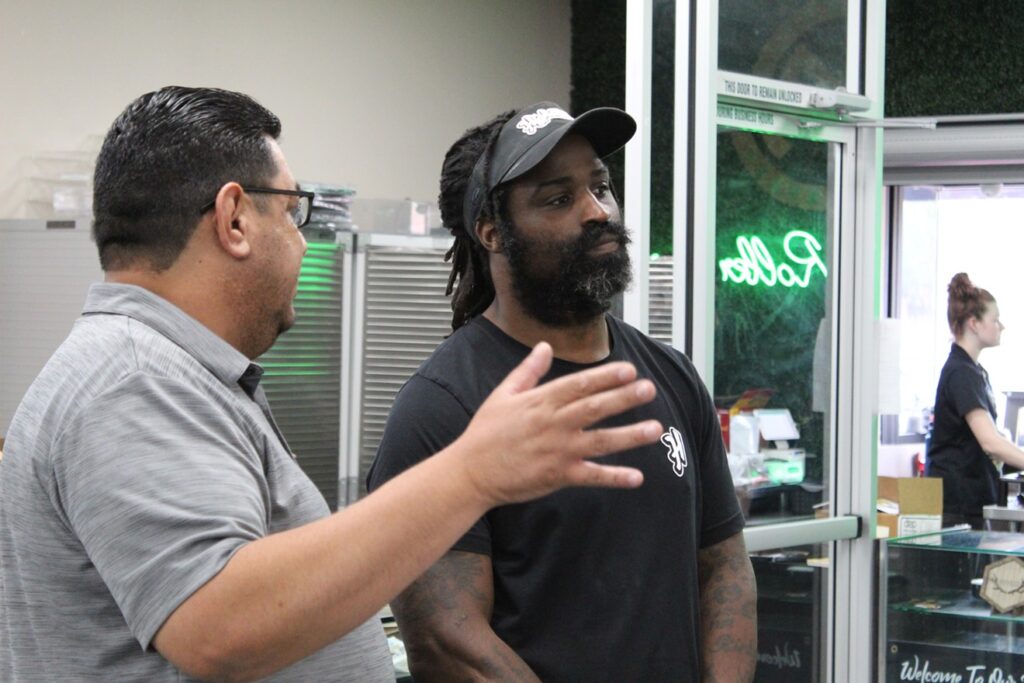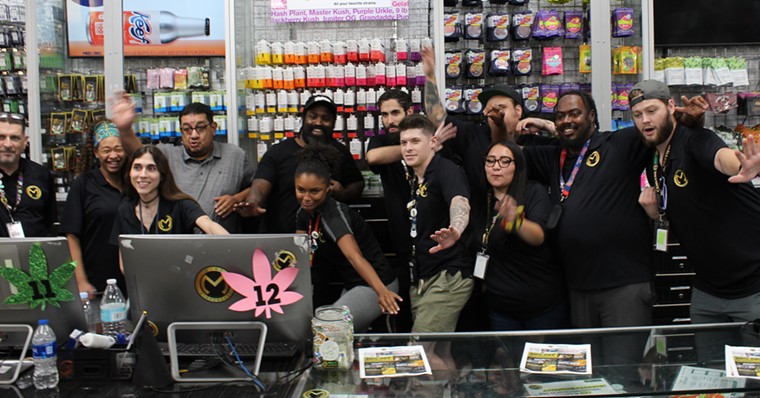NFL Great Ricky Williams Visits Mint’s Kitchen

Even an NFL great, rushing more than 10,000 yards, couldn’t break the grip of the cannabis-infused grub at The Mint Café in Tempe last week.
On July 28, NFL legend and 1998 Heisman Trophy winner Ricky Williams visited the 12,000-square-foot dispensary and the first cannabis-infused kitchen in the U.S. with delivery services. “Ricky ordered a [vegan] burger and a pizza from our cafe,” said Pablo Palomino, chief branding officer of The Mint dispensary. “He visited a few departments and saw firsthand how The Mint operates.”
In May, right around his 45th birthday, Williams publicly said he changed his legal name to Errick Miron, assuming his birth name and his wife’s last name. On his Highsman cannabis brand website, however, the San Diego native is still referred to by his Ricky Williams monicker known worldwide for scoring 66 touchdowns playing in the NFL.
On The Mint dispensary’s social media video, the Miami Dolphins’ former running back is seen viewing the kitchen, vault, and showroom, as well as hanging out with the employees. Some staffers even busted out the iconic “Unitas” football pose in a photo with the star player who rocked the No. 34 jersey.
Raul Molina, chief operating officer of The Mint, gave the Pro Bowl player the tour. “It was impressive to see how well-versed he is in everything cannabis,” Molina said in a Phoenix New Times interview. “We talked shop and shared views on many things. Everything from working together to carrying his products to Super Bowl promotions this coming year.”
Last year, Williams launched his Highsman cannabis line — a wordplay on his collegiate football award — which includes Pregame, a sativa; Halftime, a hybrid; and Postgame, an indica.
And with Super Bowl LVII at State Farm Stadium in Glendale kicking off on February 12, 2023, Molina’s ready for Williams to make a memorable return to The Mint’s three dispensaries in the Valley, the other two being in Mesa and Phoenix. “We agreed to meet again in the near future and discuss possibilities,” he added.

Williams played pro ball with the New Orleans Saints from 1999-2001, then the Miami Dolphins from 2002-2003 and 2005. Williams then played for the Toronto Argonauts, in the Canadian Football League, in 2006, followed by a return to the NFL in Miami in 2007, where he played until 2010. He played his final season in Baltimore with the Ravens in 2011. The NFL suspended Williams five times during his football career for violating the league’s substance-abuse policy as he was using marijuana to battle social anxiety disorders.
Williams said he retired from the NFL to avoid the humiliation of his marijuana use being made public.
But that was then.
In October 2015, Williams came full circle about his cannabis consumption during the heyday of his football career, when his former Saints teammate Kyle Turley invited him to speak about his marijuana experience at a conference in Phoenix. According to a Sports Illustrated article, “For the first time, Williams told his story to a group of strangers [in Phoenix]. He told them he wouldn’t have won the 1998 Heisman Trophy or played 11 NFL seasons without cannabis. They showered him with a standing ovation.”
Molina recalled those “comeback” days.
“It’s important for those with a national platform and the influence to share their experiences with the world,” he told New Times. “It shows where [they] came from.”
The Sports Illustrated story continued, stating Williams “figures he lost between $5 million and $10 million in salary and endorsements when his NFL career stalled out because of four failed drug tests (all, he says, for marijuana) between 2002 and ’06. He wants to make that back and then some.”
Molina added, “Like with Ricky, the impact previous policies has had on many people across the country is still felt. Nonetheless, we are moving forward and beginning the reparation process. Thanks to great people like Mr. Ricky Williams for helping fight that fight through R&D and education.”
Williams said that realizing there was more to him than just being a football player created an urge to start developing his other sides. He noted, “It was, and still is, my appreciation for cannabis that helped me to realize my potential for greatness outside the game of football.”
Hence, Highsman. (SOURCE)
